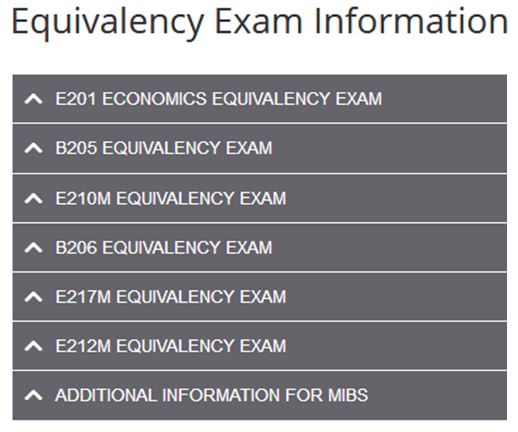Pre-semester Preparatory Primer, Part II: what’s the deal with equivalency exams?
Today we turn our attention to equivalency exams, which I think of as relatively straightforward, but which nonetheless tend to generate a lot of questions and the occasional bit of confusion. So, what’s the deal with equivalency exams?
 Equivalency exams provide students with certain economics and quantitative backgrounds the opportunity to satisfy the quantitative reasoning breadth requirement, or to start immediately with a higher-level economics course to meet the economics requirement (details on course requirements available here). The exams are administered toward the end of Orientation, and are not required. If you have zero background in economics, statistics, or other types of quantitative analysis, you can safely ignore this portion of Orientation, and plan to take the intro courses in these subjects to fulfill curricular requirements (that’s E201 and B205/6, for those already fluent in coursecataloguese). Most incoming Fletcher students have at least rubbed shoulders with these subjects in some form, though, so it’s recommended that students give the exams a shot, even if you’re feeling like your familiarity with the material has gotten a bit rusty.
Equivalency exams provide students with certain economics and quantitative backgrounds the opportunity to satisfy the quantitative reasoning breadth requirement, or to start immediately with a higher-level economics course to meet the economics requirement (details on course requirements available here). The exams are administered toward the end of Orientation, and are not required. If you have zero background in economics, statistics, or other types of quantitative analysis, you can safely ignore this portion of Orientation, and plan to take the intro courses in these subjects to fulfill curricular requirements (that’s E201 and B205/6, for those already fluent in coursecataloguese). Most incoming Fletcher students have at least rubbed shoulders with these subjects in some form, though, so it’s recommended that students give the exams a shot, even if you’re feeling like your familiarity with the material has gotten a bit rusty.
Why take an exam you may be unlikely to pass? Important to understand is that these are basic skills tests to help place you at the appropriate point in the curriculum. They don’t count toward your academic record, and a failure to pass them (or a decision not to take them) won’t show up on your transcript. One reason to give them a shot is that you may know more than you realize, and satisfying a curricular requirement, or giving yourself the option of starting a bit deeper in the curriculum, can be beneficial. Conversely, you might also think you know more than you do, and finding that out by not quite passing an equivalency exam can help you recalibrate your expectations and identify things you need to work on during your time at Fletcher.
How does this affect you in the weeks leading up to Orientation? It doesn’t, necessarily. It’s fine to arrive at Fletcher, take the equivalency exams (or not), and proceed with course selection in accordance with the results. Incoming students often ask how they can study or prepare for the exams, though. My recommendation is not to worry too much about studying for the exams themselves. If your econ and quant skills are such that you’ll need a lot of study to pass the equivalency exam, it’s likely a sign that you should start with the intro levels of these courses. Best to use the exams as a gauge of your current familiarity with these subjects without skewing the data with a lot of last-minute cramming. However, it can still be worth your time to brush up on these subjects in a low-level fashion ahead of your arrival at Fletcher. A familiarity with the basic terminology and concepts of micro and macroeconomics and statistics will allow you to dive into these courses confidently, even if you’re starting at the introductory levels. To wit: the summer before I began my own MALD studies at Fletcher, I worked my way through an intro microeconomics textbook on my own, at a rate of a few hours per week. No pressure, no stress, no rush; just poking around your basic supply and demand curves a bit. It had been many years since I’d taken an economics class, and I was a bit nervous about entering Fletcher while functionally starting from scratch with my understanding of economics. Though I still opted to take E201 to fulfill the baseline economics requirement, this casual self-study was possibly the single most helpful bit of preparation I did prior to starting grad school. The modest amount of contextual knowledge I gained from this exercise was extremely useful in the classroom (and not just econ classes).
So don’t burden yourself with a lot of worry about equivalency exams; you’ll figure out your proper starting point in the economics and quantitative portion of the curriculum. Do, however, consider the longer-term value of a bit of self-guided preparation in advance. When Prof. Kowalczyk cold-calls on you to explain the effect on supply of a price ceiling set below market price, imagine how good it will feel to stifle a yawn, affect a bored tone, and confidently respond that, natch, it will result in a supply shortage.